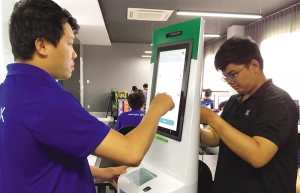Fintech startups urged to think for long term
 |
| Fintech startups urged to think for long term, Photo: Le Toan |
In the first three quarters of 2022, fintech investment in Vietnam accounted for only 5 per cent of the total of this type of funding in Southeast Asia, but the new year is expected to bring many more opportunities.
Despite the incomplete legal framework for this sector, fintech was still a hot keyword in 2022 in Vietnam’s startup community. According to data from Do Ventures and Cento Ventures, financial services still attracted $162 million, up 2.6 times from the previous year’s $61 million.
In early 2022, MoMo officially reached unicorn status with a valuation of over $2 billion, after announcing the completion of the fifth round of funding. Prior to that, the two other startups in the Vietnamese unicorn club were VNG and VNPay. Both are multi-field businesses, which includes fintech.
“Seeing the potential of the market, investors are willing to spend large amounts of money to build a set of existing customers, so that in the future they can provide full banking services,” said Do Danh Thanh, deputy general director of digital transformation and IT strategy at Deloitte Vietnam.
A report on venture capital (VC) activity and trends for 2023 by Golden Gate Ventures also forecasts that capital flows will focus more on the health and financial sectors in the next decade, despite the slowdown of VC in 2022. Particularly, Southeast Asia will see many emerging unicorns in the fintech field.
Among other countries in the region, Vietnam saw a relegation in the funding race of 2022, with investment accounting for only 5 per cent of the total in the first nine months, according to a fresh report titled Fintech in ASEAN 2022 by UOB, PwC Singapore, and the Singapore Fintech Association.
Specifically, Singapore and Indonesia continue to be the most successful Southeast Asian countries in fundraising, taking up 76 per cent. Meanwhile, Vietnam and the Philippines recorded a sharp decrease in the proportion of investment compared to 2021.
However, embedded finance, the seamless integration of financial services adopted by non-financial companies and one of the biggest fintech trends in the next decade, is especially evident in Vietnam, Thailand, and Indonesia.
In Vietnam, 83 per cent of respondents said they have used embedded financial applications, while the average usage of these apps in the region is 70 per cent. On average, almost three out of four users in the region of apps with embedded financial services use them at least once a week, with the highest in Vietnam at 85 per cent.
“This underscores how such apps have the potential to increase user engagement through enhanced utility,” the report assessed. “Embedded financial services in Vietnam are used most in the field of small-scale investment (28 per cent), followed by integrated insurance in travel and transportation services (23 per cent).”
In the midst of the global financial crisis of 2022, many Vietnamese startups continued to successfully raise capital, with a total of nine deals, including Finhay ($25 million), Timo ($20 million), and VUIAPP ($6.4 million). Even though the $211.4 million total was still a decline compared to 2021, experts assessed that this small setback might present an opportunity for fintech growth in Vietnam in the coming years.
“The reason for growth has been digital transformation. This remains an important cornerstone for embedded finance. And the ones set to capitalise on this are small- and medium-sized enterprises and micro merchants,” noted Nguyen Huu Tuat, co-founder and CEO of NextPay.
Jalil Rasheed, managing director at the Tony Blair Institute For Global Change, added, “The next stage of VC investments is predicted to create a fintech boom in Southeast Asia. In particular, Vietnam is strengthening its reputation as a safe, effective home for VC, especially in fintech and e-commerce, as these are the areas attracting the biggest investment in 2022.”
However, startups are encouraged to aim for sustainable rather than short-term and trendy models.
“The retail and consumer market in Vietnam is still developing strongly. At the same time, the internet economy is forecasted to grow up by 11 times by 2030, ranking first in terms of growth speed in Southeast Asia. With that opportunity, fintech in Vietnam still has a fertile ground to innovate,” said Bui Thanh Do, founding partner and CEO of ThinkZone Ventures.
The challenge is to create revolutionary and accessible solutions that bring value to users. Successful companies must simultaneously solve problems in customer classification, business models, bad debt settlement, and tech application in optimising solutions and processes, according to Do. “Another challenge is that in Vietnam, user data is quite fragmented. If this can be improved, there will be more breakthrough solutions from startups in the future. And it is the founders’ responsibility to try and find ways to optimise the company’s products and businesses to meet the market requirements,” he said.
 | Digesting fintech sandbox draft rules A couple of months ago, the Vietnamese government issued a second draft decree on implementation of the regulatory sandbox for fintech. |
 | Unbinding legal bottlenecks to spur fintech development Despite the hot-paced development experienced in Vietnam’s fintech industry, the bottlenecks in the regulatory system have yet to be fully addressed in the face of current financial constraints. |
 | Fintech future in store for smarter M&A deals Cross-border merger and acquisition deals are being altered as a direct result of increasing inflation. Nevertheless, foreign investors are exploring untapped potential in the fintech industry to stay competitive in the digital era. |
What the stars mean:
★ Poor ★ ★ Promising ★★★ Good ★★★★ Very good ★★★★★ Exceptional
Themes: Digital Transformation
- Dassault Systèmes and Nvidia to build platform powering virtual twins
- Sci-tech sector sees January revenue growth of 23 per cent
- Advanced semiconductor testing and packaging plant to become operational in 2027
- BIM and ISO 19650 seen as key to improving project efficiency
- Viettel starts construction of semiconductor chip production plant
Related Contents
Latest News
More News
- A golden time to shine within ASEAN (February 19, 2026 | 20:22)
- Vietnam’s pivotal year for advancing sustainability (February 19, 2026 | 08:44)
- Strengthening the core role of industry and trade (February 19, 2026 | 08:35)
- Future orientations for healthcare improvements (February 19, 2026 | 08:29)
- Infrastructure orientations suitable for a new chapter (February 19, 2026 | 08:15)
- Innovation breakthroughs that can elevate the nation (February 19, 2026 | 08:08)
- ABB Robotics hosts SOMA Value Provider Conference in Vietnam (February 19, 2026 | 08:00)
- Entire financial sector steps firmly into a new spring (February 17, 2026 | 13:40)
- Digital security fundamental for better and faster decision-making (February 13, 2026 | 10:50)
- Aircraft makers urge out-the-box thinking (February 13, 2026 | 10:39)

 Tag:
Tag:

















 Mobile Version
Mobile Version